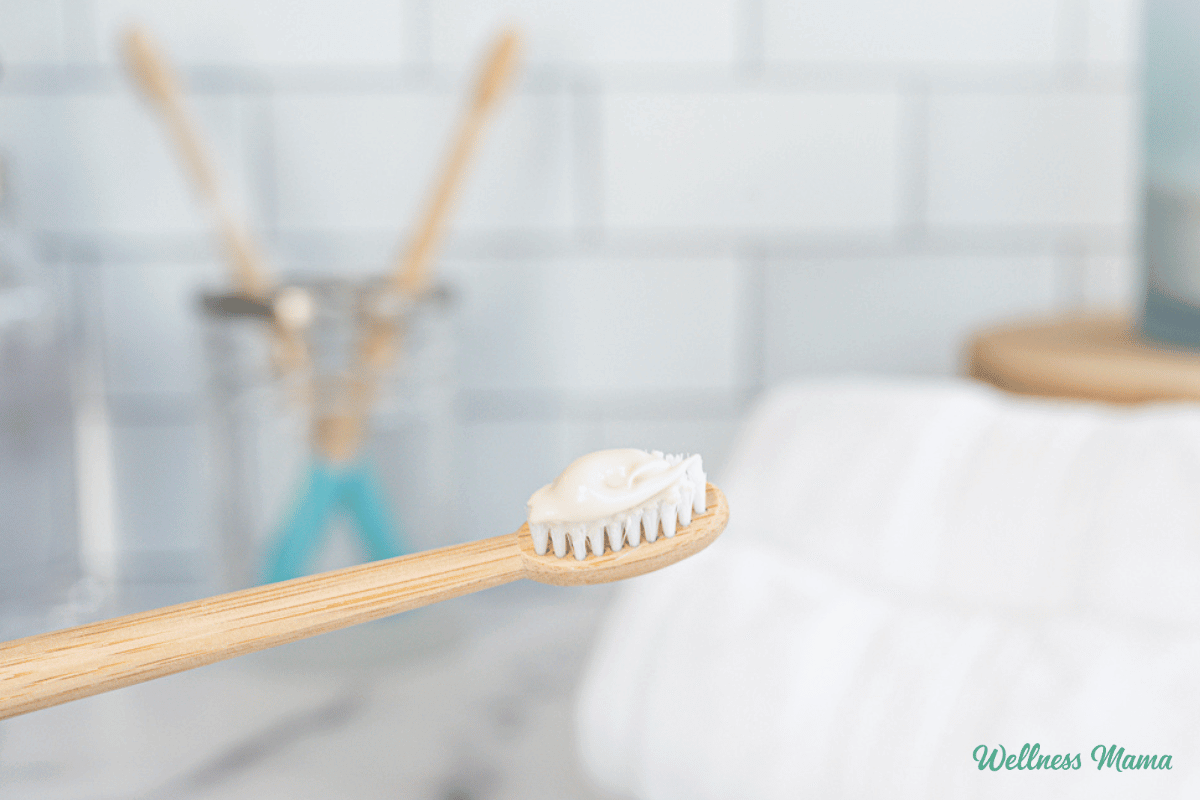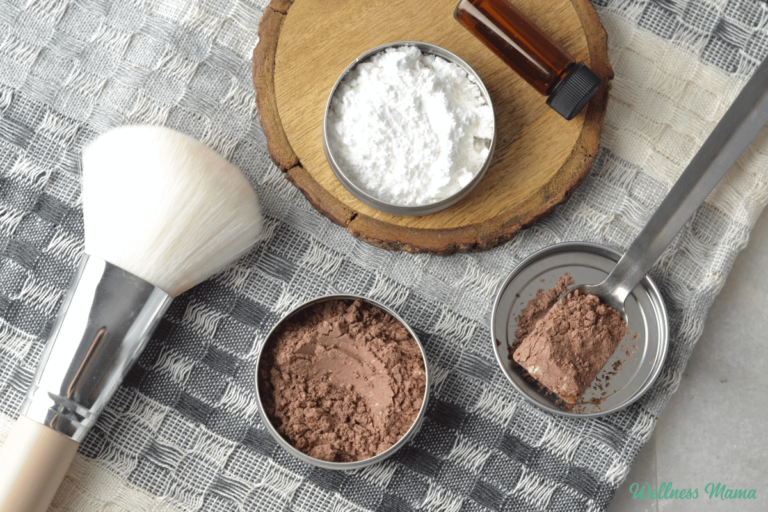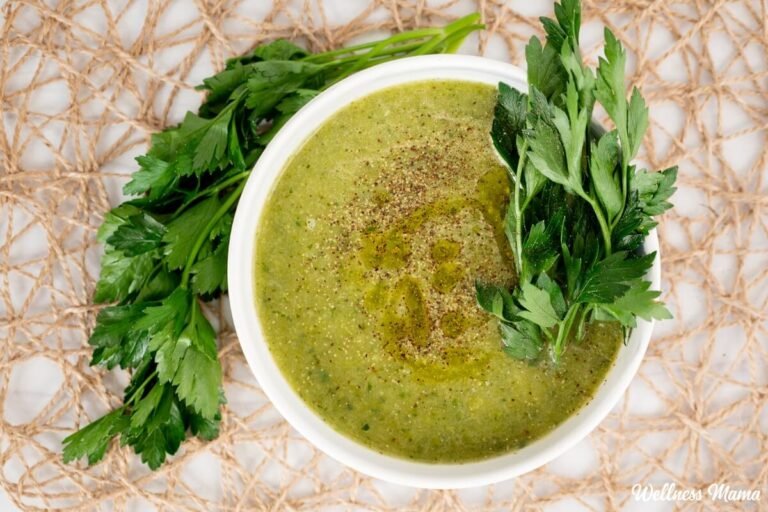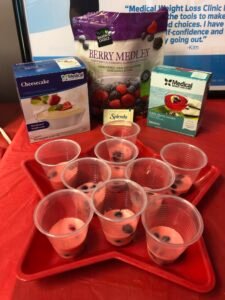Toothpaste has been a passion of mine ever since I learned teeth can be remineralized. I used to always make my own, but there are so many good options out there now. However, there are plenty of brands that claim to be natural yet have sketchy ingredients.
Here are some of the best natural toothpaste brands that are non-toxic and beneficial to your teeth.
What’s Wrong With Conventional Toothpaste?
Conventional toothpaste on Amazon or at the local big box store has questionable ingredients. Some are toxic, and others prevent teeth from remineralizing. Many are also too abrasive, leading to a gradual breakdown of tooth enamel when they’re used as part of your oral care routine. Here are some ingredients to look out for when shopping for toothpaste:
Parabens
Parabens are sometimes used as preservatives in toothpaste. They’re added to many personal care products to prevent mold or bacteria growth. Mold prevention is of course a good thing. However, they’re also known to be endocrine disruptors, meaning they could mess with hormones.
Parabens have also been linked to breast and testicular cancers. While more research is needed, it’s best to avoid parabens. Especially in any product that goes on the skin or in the mouth.
Sodium Lauryl Sulfate (SLS)
Sodium lauryl sulfate (or its cousin sodium laureth sulfate) is a foaming agent in toothpaste. While it gives brushing your teeth the impression of a scrubby bubble clean, it can irritate the oral tissues. For some people, SLS causes painful canker sores.
Sweeteners
While it may seem obvious not to have sugar in your toothpaste, artificial sweeteners aren’t a good substitute. Examples of these sweeteners are saccharin, erythritol, and aspartame. They can cause tissue irritation and have some links to cancer.
Vegetable glycerine is also used as a sweetener. While it’s often derived from coconut or palm oil, glycerin can also come from soy. Unfortunately, most soy products are genetically modified. There’s also some concern that glycerin could coat the teeth and prevent the enamel from remineralizing.
The one exception I make is for xylitol. It’s a sugar alcohol with proven oral health benefits. While I don’t like to eat a lot of it (it can irritate the gut), I do use it in toothpaste. It’s naturally found in fruits and veggies and doesn’t impact blood sugar
Dyes
Chemists add dyes to make that lovely aquamarine or red color characteristic of a few famous brands. They’re often used in fruity kids’ toothpaste, like strawberry or watermelon flavors. In theory, these dyes make brushing teeth more appealing and fun. However, they can also contribute to inflammation and irritation in the mouth. Avoid FD&C dyes, like Red 30 and Blue 1 Lake.
Artificial Colors and Flavors
Artificial anything isn’t a great thing to be putting into your body. Remember, much of what you put in your mouth eventually absorbs into the bloodstream. Artificial ingredients may create inflammation and contribute to many health issues.
Microplastics
Microplastics can also show up in some toothpaste brands. Tiny plastic beads or particles are sometimes used as abrasives or exfoliators. The Ocean Blue Project is a non-profit dedicated to keeping our oceans safe and free of toxins, including plastics. They share that if your toothpaste label lists polypropylene or polyethylene, it has microplastics.
Triclosan
Triclosan is a pesticide used in some toothpaste to fight plaque and gingivitis. However, it’s also an endocrine-disrupting chemical. Some animal studies have shown high amounts of triclosan could impact thyroid function. Other evidence points to triclosan potentially contributing to antibiotic-resistant bacteria. EGCG from green tea is a healthier alternative.
What to Look for in a Natural Toothpaste
Keep an eye out for these on a toothpaste label.
- Fluoride-free
- SLS-free
- Sulfate-free
- Gluten-free
- Contains no artificial sweeteners
- Cruelty-free
- Coconut oil
- Baking soda
- Aloe vera
- Essential oils like peppermint, spearmint, wintergreen, and tea tree oil
- Calcium hydroxyapatite
- Herbs that benefit oral health
- Xylitol for remineralization and plaque reduction
Hydroxyapatite Toothpaste
Calcium hydroxyapatite is a key ingredient to look for. It’s a form of calcium that makes up 97% of tooth enamel. Even better, it can help remineralize and restore damaged enamel. Plus it helps maintain strong, healthy teeth as we age.
Some toothpastes have nano-hydroxyapatite, which is synthetic and something I avoid. Micro-hydroxyapatite however is the smallest natural hydroxyapatite available. Even though the nano size is smaller, it may not be the better option since it’s still synthetic.
Hydroxyapatite is a great way to remineralize teeth naturally and help prevent tooth decay. When teeth are healthy and strong, it also helps reduce tooth sensitivity. Many natural brands are opting for hydroxyapatite instead of fluoride, but be sure to look out for which kind they use.
Review of Common Natural Toothpastes
1. Tom’s of Maine:
Let’s look at Tom’s of Maine Natural Fluoride-Free SLS-Free Botanically Bright Toothpaste, Peppermint. It appears to be a healthy option. After all, it’s fluoride-free, SLS-free, and sweetened with sugar alcohols and stevia. Here’s the full list of ingredients.
Ingredients
Water, hydrated silica, sorbitol, glycerin, xylitol, lauryl glucoside, sodium cocoyl glutamate, natural flavor*, benzyl alcohol, xanthan gum, titanium dioxide, carrageenan, Stevia rebaudiana extract, propolis extract. *peppermint oil and other natural flavor
Is this a good natural toothpaste option? Well, let’s look at a few of the listed ingredients.
- Carrageenan is something to avoid in anything that goes in the mouth (food or toothpaste). In animal studies, researchers use it to cause inflammation.
- Natural flavor – Described as peppermint oil and “other natural flavor.” It gives the toothpaste its mint flavor. Manufacturers can use any number of chemicals, including MSG.
This toothpaste has a few questionable ingredients and doesn’t offer a lot to remineralize teeth.
2. Spry Kids:
Next up, Xlear – Spry Kid’s Tooth Gel with Xylitol, Original Flavor. This toothpaste has a very short list of ingredients, as you can see below.
Ingredients
Purified Water, Xylitol, Calcium Glycerophosphate, Cellulose Gum, Grapefruit Seed Extract.
The least familiar ingredients listed are likely the calcium glycerophosphate and cellulose gum. Some use calcium glycerophosphate as a calcium dietary supplement. Cellulose gum is a soluble fiber used as a thickener. All the ingredients in this product are safe for use in toothpaste and help prevent cavities.
Spry is also one of the few toothpaste brands that use xylitol NOT derived from corn (for those with allergies or sensitivities). It doesn’t have any flavor but teeth feel clean afterward.
3. Jason:
Jason is a common brand in natural foods and supplement stores. This company has both fluoride toothpaste and fluoride-free toothpaste. Here, we’ll review Jason Simply Coconut Strengthening Toothpaste, Coconut Mint.
Ingredients
Glycerin, Aloe Barbadensis Leaf Juice (Certified Organic Ingredient), Calcium Carbonate, Sodium Cocoyl Glutamate, Cocos Nucifera (Coconut) Oil (Certified Organic Ingredient), Helianthus Annuus (Sunflower) Seed Oil, Mentha Piperita (Peppermint) Oil, Mentha Viridis (Spearmint) Leaf Oil, Bambusa Arundinacea Stem Powder, Citrus Grandis (Grapefruit) Seed Extract, Ascorbic Acid, Cellulose Gum, Magnesium Oxide, Sodium Bicarbonate, Flavor (Natural).
Natural flavor is suspect since it’s listed in addition to the essential oils of peppermint and spearmint. Otherwise, the ingredients list is pretty clean.
4. Dr. Bronner’s All-One Toothpaste:
People know Dr. Bronner’s brand for its All-One soaps. Some even use them as a substitute for toothpaste. However, they also have a toothpaste line, which includes Dr. Bronner’s All-One Toothpaste (Peppermint). This toothpaste is 70% organic ingredients, fluoride-free, and SLS-Free. Here’s what’s in it:
Ingredients
Organic Glycerin, Organic Aloe Barbadensis Leaf Juice, Hydrated Silica, Calcium Carbonate, Xanthan Gum, Sodium Bicarbonate (Baking Soda), Potassium Cocoate (made with Organic Coconut Oil), Organic Mentha Piperita (Peppermint) Oil, Organic Mentha Arvensis (Menthol) Crystals, Organic Cocos Nucifera (Coconut) Flour, Organic Cocos Nucifera (Coconut) Oil, Tocopherol, Citric Acid, Organic Stevia Rebaudiana Leaf/Stem Extract.
This is a pretty clean and organic toothpaste. Like many of the others, it may get teeth clean but doesn’t offer much in the way of remineralizing teeth. I found it hard to get my teeth feeling clean with this one because it was so non-abrasive.
5. David’s:
David’s Nano Hydroxyapatite Natural Toothpaste, Peppermint has hydroxyapatite, to strengthen enamel. While that’s a positive, nano-hydroxyapatite is the synthetic version.
Ingredients
Calcium carbonate (limestone abrasive), vegetable glycerin, purified water, sodium bicarbonate (baking soda), xylitol (birch derived), hydrated silica, hydroxyapatite, sodium cocoyl glutamate, carrageenan (seaweed derived), mentha piperita (peppermint oil), mentha viridis (spearmint) leaf oil, pimpinella anisum (anise) seed extract, gaultheria procumbens (wintergreen) leaf oil, stevia (leaf extract).
David’s hydroxyapatite toothpaste is pretty good, and it comes in an old-fashioned recyclable metal tube with a key roller. Carrageenan is also there, contributing to irritation and potentially canker sores.
6. Boka
Boka has nano-sized hydroxyapatite (synthetic) for stronger enamel. It’s also fluoride-free, SLS-free, paraben-free, and free of artificial flavors. It’s also free of all endocrine disruptors. Their Ela-Mint toothpaste has the following ingredients:
Ingredients
Water, Vegetable Glycerin, Hydrated Silica, Sorbitol Powder, Silica, Hydroxyapatite (Nano), Sodium Benzoate, Sodium Lauroyl Sarcosinate, Mentha Piperita Essential (Peppermint) Oil, Mentha Viridis (Spearmint) Oil, Illicium Verum (Star Anise) Oil, Gaultheria Procumberis (Wintergreen) Oil, Xylitol, Xanthan Gum, Stevia Rebaudiana Extract Powder, Methylsulfonylmethane, Aloe Barbadensis (aloe Vera) Leaf Juice, Sodium Bicarbonate, Camellia Sinensis (Green Tea) Leaf Extract, Cucumis Sativus (Cucumber) Fruit Extract, Persea Gratissima (Avocado) Fruit Extract, Mangifera Indica (Mango) Fruit Extract, Menthol, Elettaria Cardamomum Miniscula Seed (Cardamom), Potassium Chloride.
Boka has natural ingredients that help with teeth whitening. And the xylitol and essential oils are really helpful for preventing cavities and general oral health. The downside here is that the nano-hydroxyapatite is synthetic.
7. RiseWell
RiseWell is a hydroxyapatite toothpaste with lots of essential oils and natural sweeteners. Some people experience gastrointestinal issues from artificial sweeteners like erythritol which is also in this brand. It can cause problems like gas, bloating, and stomach pain.
Ingredients
Silica, Sorbitol, Glycerin, Xylitol, Hydroxyapatite, Calcium Carbonate, Propanediol, Potassium Cocoate, Stevia Rebaudiana Extract, Mentha Arvensis (Wild Mint) Oil, Mentha Piperita (Peppermint) Oil, Cinnamomum Cassia (Cinnamon) Bark Extract, Citrus Aurantium Dulcis (Orange) Peel Oil, Citrus Limon (Lemon) Peel Oil, Melaleuca Alternifolia (Tea Tree) Oil, Cellulose Gum, Sodium Gluconate, Menthol, Thymus Vulgaris (Thyme) Extract, Erythritol, Xanthan Gum, Eucalyptus Globulus Extract, Illicium Verum (Anise) Extract.
RiseWell has beneficial essential oils for fresh breath and oral health, but it’s not clear what type of hydroxyapatite they use though, and it has artificial sugar alcohols. Glycerin can also be a concern as some studies show that it can impact the ability for hydroxyapatite to soak into the tooth enamel.
Best Natural Toothpaste Brand
My favorite natural toothpaste is the one I helped create! (No surprise there). So even though it’s at the end of the review, you could say it’s number one.
Wellnesse
Wellnesse is what I use and recommend. It’s the first brand that uses natural hydroxyapatite for tooth remineralization but also skips the glycerin and fluoride.
Fluoride is bad news when it’s absorbed or swallowed, and there’s some concern glycerin isn’t the best for teeth. While there isn’t hard evidence on glycerin and teeth, I prefer to err on the side of caution and avoid it when it’s paired with hydroxyapatite.
Wellnesse has natural whitening toothpaste and charcoal toothpaste. There’s also a kid’s strawberry version and a cinnamint flavor. Here are the ingredients for the regular whitening toothpaste and the charcoal version.
Wellnesse Fresh Mint Whitening Toothpaste Ingredients
Calcium Carbonate, Sorbitol, Water, Sodium Bicarbonate, Xylitol, Silica, Hydroxyapatite, Sodium Cocoyl Glutamate, Metha Piperita (Peppermint) Flavor, Xanthan Gum, Stevia Rebaudiana Leaf Extract, Aloe Barbadensis Leaf Extract, Melia Azadirachta (Neem) Seed Oil, Camellia Sinensis (Green Tea) Leaf Extract
Wellnesse Charcoal Toothpaste Ingredients
Calcium Carbonate, Sorbitol, Purified Water, Sodium Bicarbonate, Xylitol, Silica, Hydroxyapatite, Sodium Cocoyl Glutamate, Mentha Piperita (Peppermint) Oil, Activated Charcoal Powder, Xanthan Gum, Menthol, Aloe Barbadensis Leaf Extract, Stevia Rebaudiana Leaf Extract, Camellia Sinensis (Green Tea) Leaf Extract
Xylitol is great for cavity prevention and the natural hydroxyapatite strengthens enamel. Then there’s activated charcoal to help naturally whiten and detox the mouth.
Wellnesse also has Children’s Strawberry Toothpaste (formulated on the same ingredients as the Whitening Toothpaste), toothbrushes, probiotic mints to support the oral microbiome, silk floss, and oral care gift sets, not to mention skin care. More recently they’ve come out with a Balanced Mouth Blend to boost toothpaste or use as a mouthwash.
You can check out all of their oral care items (including toothpaste) here.
Bottom Line: Ingredients Matter!
It’s possible to have minty fresh breath and whiter teeth with natural toothpaste. Many also have antiplaque and anticavity ingredients too. The key is to find a toothpaste that’s not only free of toxic ingredients but supports oral health.
Keep in mind that bad breath or sensitive teeth may indicate something else is going on in your body. Oral health can reflect overall health. Be sure to work with your healthcare practitioner to get thorough testing and restore function to your body.
What kind of toothpaste do you use? Have you been able to remineralize your teeth? Share with us below!








